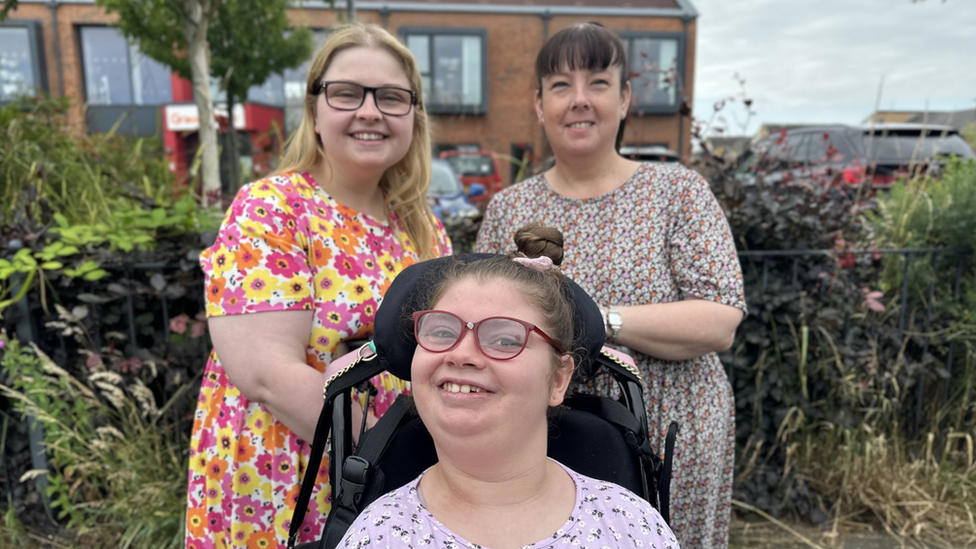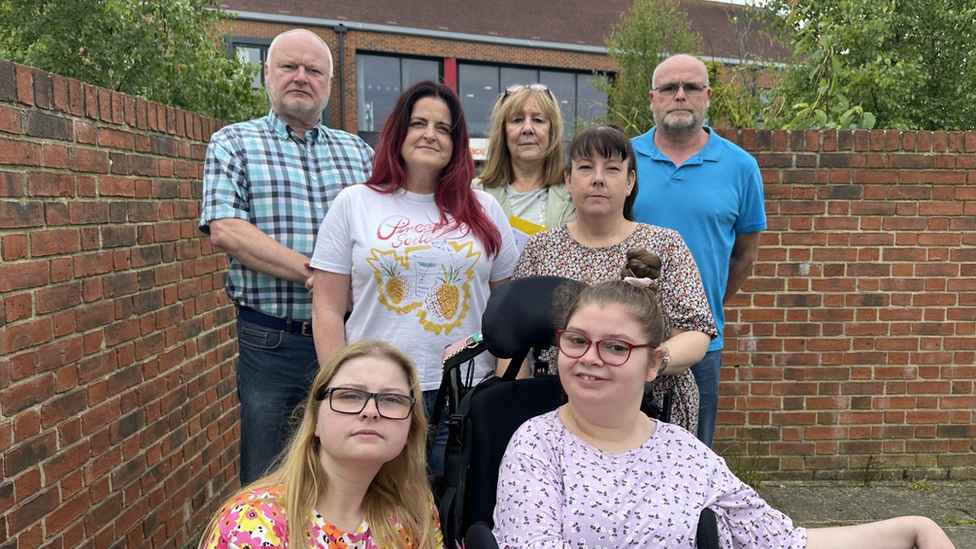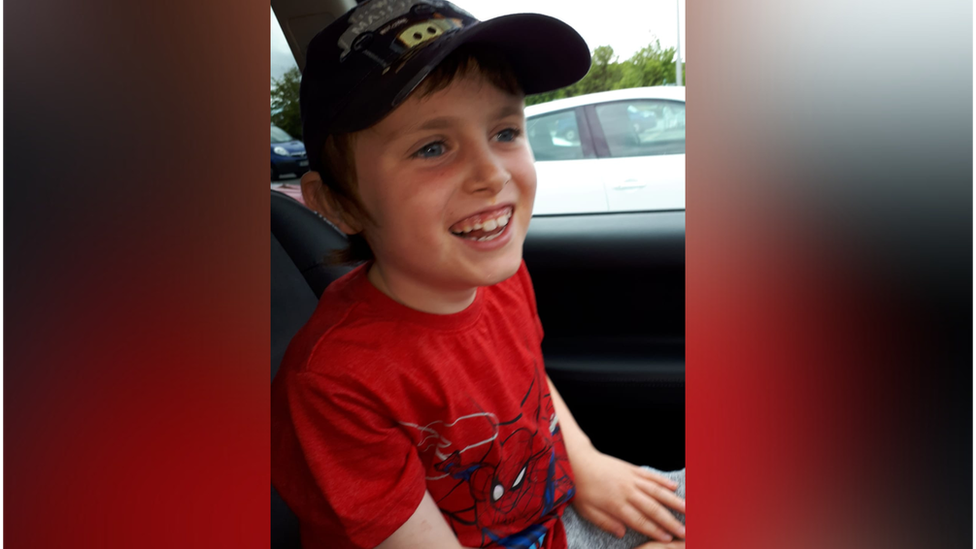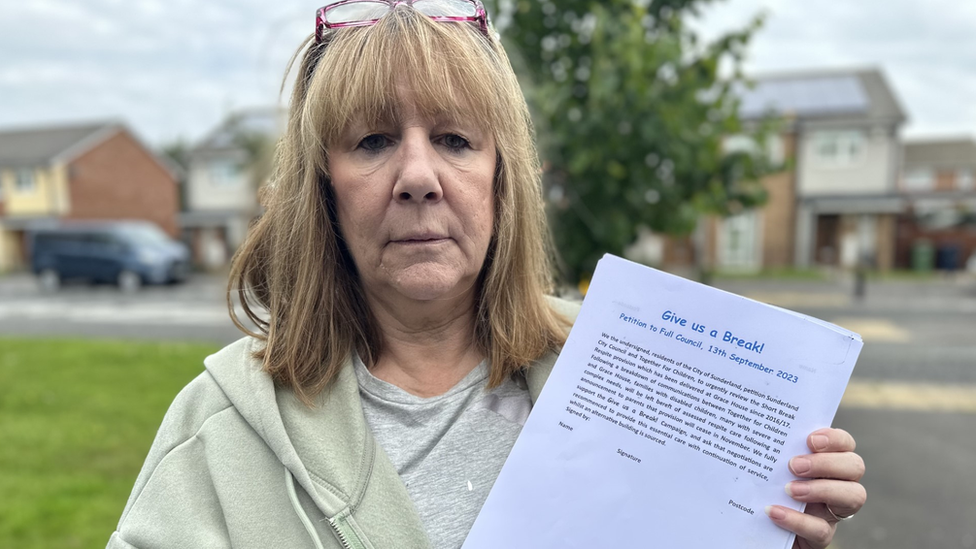Sunderland parents say disabled care closure 'catastrophic'
- Published

Katie has been receiving care at Grace House for the past several years
Disabled children will have "nowhere else to go" once a city's only respite care service closes, parents fear.
Families have described the decision to axe short breaks at Grace House in Sunderland as "catastrophic".
It follows unsuccessful talks between the charity - also called Grace House - and a council-run service over costs.
Together for Children (TfC), which provides children's services on behalf of the council, said it was "working hard" to maintain respite care.
First opened in 2003, Grace House offers up to eight beds for children with disabilities to spend time away from home.
It is designed to relieve parents of their caring duties, allowing them to look after siblings and recuperate.

Councillors Michael Hartnack and Simon Ayre join parents Emma, Pam and Tracy
The service operates inside the charity's purpose-built premises in Bardolph Drive, but is run by a company on behalf of the council.
However, the provision is due to come to an end in November, transferring directly to TfC, who are yet to secure an alternative site.
Tracy Cruddas, mother of 16-year-old Katie who has cerebral palsy, said she had grave concerns.
"The care has made a huge difference," she told the BBC.
"It provides social time for Katie, to be with her friends, who she would not be able to meet up with outside of Grace House.
"She will now become isolated as it is very difficult to meet up outside, especially with her friends who have similar needs."
Ms Cruddas, from Tunstall, said respite care allowed her and family members to take a vital break from providing round-the-clock support.
"It's catastrophic for families. It may take years to find another building. The only way to get a break is respite."

Sam, 13, is one of the children who attends Grace House for respite care
Emma Hubbard's 13-year-old son Sam has autism, attention deficit hyperactivity disorder (ADHD), epilepsy, anxiety and obsessive-compulsive disorder (OCD).
The nurse and carer, from Doxford Park, described the service as a lifeline, which had "changed our lives" and allowed her to hold down a job.
"He comes here and it is like a holiday for him. There's everything he needs, a sensory room, soft play. Without the staff there we would not get a break - it can be 24-7."
Ms Hubbard said the closure, or any potential gap in care, could lead to "families breaking down and breaking apart" as they struggle to cope.
"We want nothing more than to keep our son with us and love him so much, but it is very, very hard having a child with additional needs."
Pam Mann has since launched a campaign and a petition to keep the service at Grace House, or keep it there until an alternative location is opened.

Pam Mann has launched a campaign to save the service from closure
The parent and former city councillor said: "We feel like nobody wants our kids, we feel like they're the lost children and we need the support, we need help.
"What we'd like to see is the only facility that we've got, Grace House in Sunderland being used and continued for short break respite, it's the only one we've got."
Grace House (the charity) said it had been informed it would no longer provide the service as part of plans to transfer respite care to TfC. It said this followed "short discussions".
However, the charity will not be winding down and and its other "essential services" at Grace House will continue.
Chief executive Victoria Brown said she understood "the anxiety this decision will have on those families" and that she supported the call for "disruption to be minimised".
TfC said it was "very aware of the concerns that have been raised", but that it was "continuing to inform, involve and consult with parents and carers on alternatives for Grace House".
"We are continuing to work hard finding alternative care for all of the children and understand how upsetting recent news has been for parents and carers."
It added that it remained open to considering any proposal "that could help us to meet the needs of our most vulnerable children".

Follow BBC North East & Cumbria on Twitter, external, Facebook, external and Instagram, external. Send your story ideas to northeastandcumbria@bbc.co.uk, external.